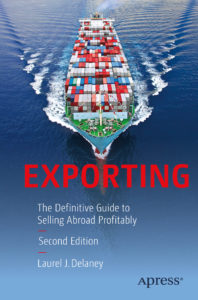In this post, I cover frequently asked questions (FAQs) about international trade.
1. How much overseas business do U.S. small businesses do globally each year?
Recent Commerce Department data shows U.S. businesses exported $2.35 trillion of goods and services in 2014, hitting a record high for the fifth straight year. U.S. goods exports increased 2.7 percent to a record $1.64 trillion in 2014 (Sources:
http://www.commerce.gov/blog/2015/02/05/us-exports-hit-record-high-fifth-straight-year and http://globalreach.blogs.census.gov/2015/02/05/december-2014-trade-deficit-increased/)
According to The Hill, “While many think trade is the domain of big business, 98 percent of the 300,000 American companies that export are small and medium-sized businesses. These firms account for one-third of U.S. merchandise exports, according to the U.S. Department of Commerce. The number of small and mid-sized companies that export has nearly tripled over the past two decades.” (Source: http://thehill.com/blogs/congress-blog/economy-budget/230092-the-little-noticed-role-of-trade-in-small-business-success).
2. How will a small business owner know if they can be successful at global trade?
If they are currently successful on a local front, they are likely to be successful on the international front. One must also achieve these five things before venturing out beyond borders:
- Become ready mentally, particularly emotionally
- Be ready operationally
- Have run a successful local business
- Know how to use the latest technology
- Have a business with export potential
3. Should a small business owner consider exporting their products into only one country at a time, or should they do many at one time?
Focus. One at a time works best until you have a proven history of success.
4. How should a small business owner determine which markets to expand in?
Once you have a good idea on what you want to export you must answer a lot of questions before determining which market to expand in. Some folks pick a market based on likeability (meaning, they like the thought of traveling to the country or have picked up on the fact through online research that there is a need for their product). Here are a few questions that should be addressed when picking a market:
- Who will buy your product and why?
- What is the size of the market?
- Who is your competition?
- How new is the product to the market you have selected?
- Are there growth opportunities in the market?
These are just a few of the many questions you need to address before digging deeper on market research. Then consult with an Export Assistance Center in your area to help you drill down further on where might be your best top markets. They can help you analyze market factors and conditions in each of the selected countries you think are ripe for entry.
5. How can a small business owner conduct market research for the area they want to expand in?
Again, an Export Assistance Center can help on this. GlobalEDGE offers an interesting Market Potential Index (http://globaledge.msu.edu/mpi) that’s worth a look. And I authored an article, “The Top Four Global Business Intelligence Companies,” which outlines how to conduct global market research using global business intelligence tools:
http://importexport.about.com/od/MarketResearch/fl/The-Top-Four-Global-Business-Intelligence-Companies.htm
6. What are the sales channel options when selling in a foreign market?
Beyond direct or indirect exporting, there are other means for entering an export market: global strategic initiatives (when a company wishes to edge into a related business or new geographic market), or what I refer to as collaborative sales. These can range from forming a partnership, to setting up a joint venture or establishing an international franchise system.
These options should be considered along with, or in addition to, direct and indirect exporting.
7. What are some things a small business owner can do to attract foreign buyers to their website?
To be discovered online, you must participate and be active on as many of the top online platforms as possible. To have customers open their wallets requires developing a relationship with them, garnering their trust, and offering products they want. That causes people to take action. Don’t think for a minute you can foster online success with a single stunning Instagram platform. It’s a start but must be supported with a Twitter, Facebook, LinkedIn, Pinterest, and Google+ presence. Putting all these social platforms to work in concert creates a winning online strategy, provided you stick to one topic or theme you are knowledgeable about.
The goal is to have a holistic or big picture view of what you are trying to accomplish with your export business and make sure the right messages get in front of the right people at the right time.
8. How does a small business owner handle currency transactions from a buyer in another country?
Transacting business in multiple currencies spanning several countries might be beneficial to a big operation interested in hedging against currency fluctuations, but for a small business, if not managed well, it can hurt the bottom line. It’s best to only negotiate terms in your country’s currency. This transfers the risk to the other party.
In “How to Get Paid on International Transactions” (http://smallbiztrends.com/2009/12/how-to-get-paid-on-international-transactions.html), I talk about the various ways to get paid on international transactions. You might also check out “How to Get Paid By International Customers.”
9. What should a small business owner know about shipping products overseas?
It’s best to work with an experienced transport company such as UPS, FedEx or DHL. They have long been considered the best in international shipping. There are smaller specialized logistic companies that are good too. You need to check references, make sure the company specializes in the area you are about to do business in and can handle fulfillment needs and collecting payments from customers worldwide.
10. Where can a small business owner learn about the duties, customs and foreign taxes that will be involved in these sales?
A logistics company can assist you with customs duties, and for foreign taxes, you should consult with a good international tax accountant. You should also consult with your accountant about foreign trade zones, and how they might help you reduce or eliminate customs duties.
Photo Credit: blake.thornberry




 There are more than 8 billion potential customers in the world looking for your product or service. Are you ready to serve them?
There are more than 8 billion potential customers in the world looking for your product or service. Are you ready to serve them?